- 1
- 2
- 3
- Basic Solution
- Advanced Solution
SaaS
Blockchain
-
BlockchainA system of recording information, which is difficult to be changed or hacked. It consists of "Blocks", that are recorded with a cryptographic hash.
End User Computing
-
Email SolutionBusiness email and calendar service with support for existing desktop and mobile email client applications.
-
VDI"Virtual Desktop Infrastructure" is a technology that uses virtual machines to provide and manage virtual desktops. It allows an access from anywhere, by any devices and yet so strong protectin. The technology helps users save cost, time, and labor as well.
-
Video ConferenceAn online technology that provides live and visual connection between two or more remote parties. It may includes features such as screen sharing, presentation file sharing, recording, etc.
-
BI Tools

Mobile
-
API GatewayAn API (Application Programming Interface) management tool located between a user and an API. It is a ptotector to enforce security before accepting all APIs from a user, ensure scalability as well as high availability. The tool determines suitable services, and returns the appropriate result.
-
Push Notification ServiceA service that provides a quick communication by delivering information from an application to different types of devices. Push notifications usually are clickable pop-up messages that users can receive as long as they are online. The service does not require users to open an application or unlock the devices in order to receive it.
-
Message Queue ServiceA service-to-service communication that is used to distribute heavyweight processing, and to smooth workloads. Basically, each message waits in a queue, is processed once by a user, and is deleted.
-
Location ServiceA service that allows users to identify their current physical location by using GPS and cellular system or Wi-Fi hotspots to detect.
-
WebSocket API
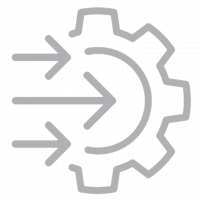 A tool to manage API which lays between API and a user to ensure the security when receiving API from outside. It can be scaled and is efficiently to use.
A tool to manage API which lays between API and a user to ensure the security when receiving API from outside. It can be scaled and is efficiently to use.
Web Service E-commerce
-
CMS"Content Management System" is a software application is used to manage web content and helps users handle all the basic part so, the users can focus on more complicated part of their website. In order to use CMS, users do not need to have programming knowledge.
-
PaymentA tool that provides payment solution on a platform as well as generate revenue from payment transactions quickly.
Game
-
GameGame as a Service (GaaS) is a continuous revenue gaming service with endless new seasons. It keeps players engage for longer and allows developers to earn revenue continuously, instead of relying on one-time purchase. GaaS monetizes from in-game purchases or subscriptions.
PaaS
IoT
-
IoTA system that detects events or changes in its environment and sends the information to physical devices that are being connected to the internet, collecting, and exchanging data with other electronic devices.
-
IoT Core Service
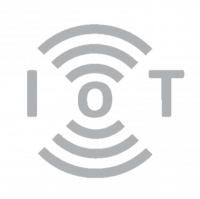 A service that helps connect to IoT and provide data exchanging route to cloud provider's service without managing infrastructure in the data center.
A service that helps connect to IoT and provide data exchanging route to cloud provider's service without managing infrastructure in the data center. -
IoT Device Management System
 A system that supports registration, arrangement, detection as well as management of IoT remotely. It basically works with IoT Core to connect and manage the devices in the cloud provider's system.
A system that supports registration, arrangement, detection as well as management of IoT remotely. It basically works with IoT Core to connect and manage the devices in the cloud provider's system. -
IoT Secured Network Zoning
 A network that uplifts connectivity speed and security between IoT and the system in cloud provider's platform.
A network that uplifts connectivity speed and security between IoT and the system in cloud provider's platform.
Security
-
FirewallA network security system that monitors and controls incoming and outgoing network traffic based on predetermined security rules. It prevents unauthorized access to or from a private network such as intranets.
-
WAFA security tool that protects web applications from attacks, by monitoring, filtering, and blocking HTTP traffic between a web application and the internet.
-
Anti-virusA program that provides protection for users' computer. It is designed to prevent, scan, detect, and remove those viruses, malware, and other cybercriminals.
Machine Learning
-
AIArtificial Intelligence (AI) is a system or a machine which is developed to imitate human intelligence. AI can also improve itself base on the information it collects.
-
MLMachine Learning (ML) is a branch of Artificial Intelligence (AI). It makes machines more human-like, in terms of bahavior. It gives devices the ability to learn from their experiences without being programmed.
-
Image & Video RecognitionAn ability of software to identify and detect objects or features in a digital image or video, by using machine vision technology. When images are taken as an input, they are captured, processed, examined, and recognized. Finally, a computer vision algorithm provides an output.
-
NLU Platform
 A platform that receives human natural language to process and is able to understand the messages.
A platform that receives human natural language to process and is able to understand the messages.
Media Services
-
Media TranscoderA tool to "digital-to-digital" convert one type of encoded data (video or audio) to another. By compressing a video or other digital content, decompressing it, altering, and re-compressing into supported output format, it can increase the number of compatible target devices a media file can be played on.
-
Media StreamingA process of delivering multimedia data, including video and audio, from a streaming service provider to an end-user via internet connected device. Media streaming uses basic HTTP, TCP/IP, and HTML protocols. Users can watch video or listen to audio content without actually downloading the media files.
-
Media LiveA method of real-time media transmission. It is a way to deliver video files or audio files a little bit at a time, which only takes few seconds, over the internet. Therefore, users do not need to download the entire videos or the audios before playing it.
Analytics
-
HadoopAn open source software framework for storing data efficiently, processing large datasets (from gigabytes to petabytes), and running applications on clusters of hardware. Hadoop provides a huge storage and allows multiple computers to analyze those database faster than using one large computer.
-
Data LakeA vast pool of data in its raw format, either structured or unstructured. Users can store data at any scale. Data Lake is developed due to the limitations of data warehouses.
-
Data WarehouseA large collection of business data which organization use for analytical purposes before making decisions. Unlike Data Lake, Data warehouse stores data from multiple databases in a more organized way. Therefore, it is easier to analyze.
-
Data Ingestion: ETL"Extract-Transform-Load" is a specific type of data ingestion. It is a process consisted of 3 steps; extract data from different sources, transform the data into a usable and trusted resource, and load that data either into Data Lake or Data Warehouse.
-
BI Dashboard"Business Intelligence Dashboard" is an information management tool that uses to analyze data and visualize information. The information can be displayed in various forms, including charts, graphs, reports, etc. BI Dashboard provides a big picture of each information being assessed for readers.
-
Real Time Messaging
 Communication between data and the data storage system or data analysis system on the internet.
Communication between data and the data storage system or data analysis system on the internet. -
Batch Load
 Processing a large amount of data at the same time that helps speed up the processing time.
Processing a large amount of data at the same time that helps speed up the processing time.
Developer Tools
-
CodePipelineA delivery service which is fully managed and automates release pipelines. It allows users to deliver features and updates quickly and reliably.
-
CodeBuildAn integration service which is fully managed. It collects source code, tests, and produces software packages that are ready to deploy. The service constantly adjust the scale and process multiple builds simultaneously. Therfore, users' builds do not have to wait in a queue.
-
CodeCommitA source control service that is managed, secured, and scalable. The service hosts private Git repositories and is used for storing a wide range of data, from code to binaries. Users do not have to manage the source control system or adjust the infrastructure scale by themselves.
-
CodeDeployA deployment service that is fully managed and automates software deployments to various computing services. The service helps decrease application deployment downtime, release new features quickly, deal with complicated updating applications process.
Blockchain
-
Blockchain Fabric Certificate
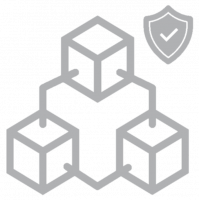 A platform that enhances security and trustworthy when users process online transactions on applications.
A platform that enhances security and trustworthy when users process online transactions on applications.
IaaS
Network and Content Delivery
-
VPCVirtual Private Cloud (VPC) is a software that provides an isolated, private environment in the cloud. Users have control over their virtual networking environment, including selection of their own IP address range, creation of subnets, and configuration of route tables and network gateways.
-
VPNVirtual Private Network (VPN) is an encrypted connection between a device and a public network. It helps prevent unauthorized people from accessing the traffic, ensures that the data is safely transmitted, and allows users to work remotely.
-
CDNContent Delivery Network (CDN) is a group of geographically distributed servers designed to improve latency. It helps speed up web content delivery by bringing it closer to users.
-
Load BalancingA process of distributing network traffic across multiple servers. It helps ensure that all servers work balancedly and improve application responsiveness.
-
DNSDomain Name System (DNS) is a naming system for computers, services, or other resources connected to the internet or a private network. Basically, DNS converts domain name into an IP address and leads users to their target website
-
IoT Device Edge Node
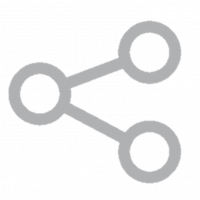 A gateway that receives data from IoT devices to store and process before sending the data to store on cloud or use to predict the business.
A gateway that receives data from IoT devices to store and process before sending the data to store on cloud or use to predict the business. -
Cloud Virtual Network
 A software that provides private environment on cloud. Users can control various actions in the virtual network such as selecting IP Address, creating subnets as well as setting routing tables and network gateways.
A software that provides private environment on cloud. Users can control various actions in the virtual network such as selecting IP Address, creating subnets as well as setting routing tables and network gateways.
Compute
-
Virtual MachineA software based on computer architectures which consists of CPU, memory, and storage to keep files. It basically provides an isolated environment, either from the host or other VMs under the same host, to run its own OS and application.
-
ContainerA software which has codes, binaries, libraries, configuration files, and all its dependencies bundled into one package. It helps an application runs quickly and reliably from one computing environment to another.
-
Auto scalingA technique to automatically scale up or down the number of compute resources that are being allocated to an application based on its needs at any given time.
-
Virtual Machine Compute Node
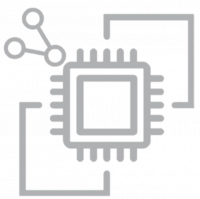 A software built from computer architecture reference, including CPU, memory and files storage. It basically creates an independent environment, separated from the host and the other virtual machines under the same host. It also manages the operation system and ensures the seamless operation on the application.
A software built from computer architecture reference, including CPU, memory and files storage. It basically creates an independent environment, separated from the host and the other virtual machines under the same host. It also manages the operation system and ensures the seamless operation on the application.
Database
-
DBMSRelational Database Management System is a software system designed to define, manipulate, and retrieve data in a relational database. RDBMS enables the interaction between an end-user and a database. Therefore, the users are able to create, read, and edit data in the relational database.
-
Caching (Redis/Memcached)A process of storing and accessing data from a cache. It helps improve the performance of any type of application since data is stored in a more efficient memory, which allows users to access the information faster. They do not need to download the information every time they access a website or application.
-
NoSQL"Not Only SQL" is a non-relational database which is a variety of types based on their data model, including key-value, document, graph, and column.
-
DB InstanceDatabase Instance (DB Instance) is a set of memory structure and background processes that access a set of database files.
Storage
-
Block StorageA data storage scheme which works as one separate hard drive. It is used to store data files on Storage Area Networks (SANs) or cloud-based storage environments.
-
Object StorageA storage as distinct units called objects, which combines pieces of data that make up a file. It is created to store unstructured data without scaling limitations and used in various cases including cloud applications, content distribution, backup, archiving, disaster recovery, and big data analytics.
SaaS
Blockchain
-
BlockchainA system of recording information, which is difficult to be changed or hacked. It consists of "Blocks", that are recorded with a cryptographic hash.
End User Computing
-
Email SolutionBusiness email and calendar service with support for existing desktop and mobile email client applications.
-
VDI"Virtual Desktop Infrastructure" is a technology that uses virtual machines to provide and manage virtual desktops. It allows an access from anywhere, by any devices and yet so strong protectin. The technology helps users save cost, time, and labor as well.
-
Video ConferenceAn online technology that provides live and visual connection between two or more remote parties. It may includes features such as screen sharing, presentation file sharing, recording, etc.
-
BI Tools

Mobile
-
API GatewayAn API (Application Programming Interface) management tool located between a user and an API. It is a ptotector to enforce security before accepting all APIs from a user, ensure scalability as well as high availability. The tool determines suitable services, and returns the appropriate result.
-
Push Notification ServiceA service that provides a quick communication by delivering information from an application to different types of devices. Push notifications usually are clickable pop-up messages that users can receive as long as they are online. The service does not require users to open an application or unlock the devices in order to receive it.
-
Message Queue ServiceA service-to-service communication that is used to distribute heavyweight processing, and to smooth workloads. Basically, each message waits in a queue, is processed once by a user, and is deleted.
-
Location ServiceA service that allows users to identify their current physical location by using GPS and cellular system or Wi-Fi hotspots to detect.
-
WebSocket API
 A tool to manage API which lays between API and a user to ensure the security when receiving API from outside. It can be scaled and is efficiently to use.
A tool to manage API which lays between API and a user to ensure the security when receiving API from outside. It can be scaled and is efficiently to use.
Web Service E-commerce
-
CMS"Content Management System" is a software application is used to manage web content and helps users handle all the basic part so, the users can focus on more complicated part of their website. In order to use CMS, users do not need to have programming knowledge.
-
PaymentA tool that provides payment solution on a platform as well as generate revenue from payment transactions quickly.
Game
-
GameGame as a Service (GaaS) is a continuous revenue gaming service with endless new seasons. It keeps players engage for longer and allows developers to earn revenue continuously, instead of relying on one-time purchase. GaaS monetizes from in-game purchases or subscriptions.
PaaS
IoT
-
IoTA system that detects events or changes in its environment and sends the information to physical devices that are being connected to the internet, collecting, and exchanging data with other electronic devices.
-
IoT Core Service
 A service that helps connect to IoT and provide data exchanging route to cloud provider's service without managing infrastructure in the data center.
A service that helps connect to IoT and provide data exchanging route to cloud provider's service without managing infrastructure in the data center. -
IoT Device Management System
 A system that supports registration, arrangement, detection as well as management of IoT remotely. It basically works with IoT Core to connect and manage the devices in the cloud provider's system.
A system that supports registration, arrangement, detection as well as management of IoT remotely. It basically works with IoT Core to connect and manage the devices in the cloud provider's system. -
IoT Secured Network Zoning
 A network that uplifts connectivity speed and security between IoT and the system in cloud provider's platform.
A network that uplifts connectivity speed and security between IoT and the system in cloud provider's platform.
Security
-
FirewallA network security system that monitors and controls incoming and outgoing network traffic based on predetermined security rules. It prevents unauthorized access to or from a private network such as intranets.
-
WAFA security tool that protects web applications from attacks, by monitoring, filtering, and blocking HTTP traffic between a web application and the internet.
-
Anti-virusA program that provides protection for users' computer. It is designed to prevent, scan, detect, and remove those viruses, malware, and other cybercriminals.
Machine Learning
-
AIArtificial Intelligence (AI) is a system or a machine which is developed to imitate human intelligence. AI can also improve itself base on the information it collects.
-
MLMachine Learning (ML) is a branch of Artificial Intelligence (AI). It makes machines more human-like, in terms of bahavior. It gives devices the ability to learn from their experiences without being programmed.
-
Image & Video RecognitionAn ability of software to identify and detect objects or features in a digital image or video, by using machine vision technology. When images are taken as an input, they are captured, processed, examined, and recognized. Finally, a computer vision algorithm provides an output.
-
NLU Platform
 A platform that receives human natural language to process and is able to understand the messages.
A platform that receives human natural language to process and is able to understand the messages.
Media Services
-
Media TranscoderA tool to "digital-to-digital" convert one type of encoded data (video or audio) to another. By compressing a video or other digital content, decompressing it, altering, and re-compressing into supported output format, it can increase the number of compatible target devices a media file can be played on.
-
Media StreamingA process of delivering multimedia data, including video and audio, from a streaming service provider to an end-user via internet connected device. Media streaming uses basic HTTP, TCP/IP, and HTML protocols. Users can watch video or listen to audio content without actually downloading the media files.
-
Media LiveA method of real-time media transmission. It is a way to deliver video files or audio files a little bit at a time, which only takes few seconds, over the internet. Therefore, users do not need to download the entire videos or the audios before playing it.
Analytics
-
HadoopAn open source software framework for storing data efficiently, processing large datasets (from gigabytes to petabytes), and running applications on clusters of hardware. Hadoop provides a huge storage and allows multiple computers to analyze those database faster than using one large computer.
-
Data LakeA vast pool of data in its raw format, either structured or unstructured. Users can store data at any scale. Data Lake is developed due to the limitations of data warehouses.
-
Data WarehouseA large collection of business data which organization use for analytical purposes before making decisions. Unlike Data Lake, Data warehouse stores data from multiple databases in a more organized way. Therefore, it is easier to analyze.
-
Data Ingestion: ETL"Extract-Transform-Load" is a specific type of data ingestion. It is a process consisted of 3 steps; extract data from different sources, transform the data into a usable and trusted resource, and load that data either into Data Lake or Data Warehouse.
-
BI Dashboard"Business Intelligence Dashboard" is an information management tool that uses to analyze data and visualize information. The information can be displayed in various forms, including charts, graphs, reports, etc. BI Dashboard provides a big picture of each information being assessed for readers.
-
Real Time Messaging
 Communication between data and the data storage system or data analysis system on the internet.
Communication between data and the data storage system or data analysis system on the internet. -
Batch Load
 Processing a large amount of data at the same time that helps speed up the processing time.
Processing a large amount of data at the same time that helps speed up the processing time.
Developer Tools
-
CodePipelineA delivery service which is fully managed and automates release pipelines. It allows users to deliver features and updates quickly and reliably.
-
CodeBuildAn integration service which is fully managed. It collects source code, tests, and produces software packages that are ready to deploy. The service constantly adjust the scale and process multiple builds simultaneously. Therfore, users' builds do not have to wait in a queue.
-
CodeCommitA source control service that is managed, secured, and scalable. The service hosts private Git repositories and is used for storing a wide range of data, from code to binaries. Users do not have to manage the source control system or adjust the infrastructure scale by themselves.
-
CodeDeployA deployment service that is fully managed and automates software deployments to various computing services. The service helps decrease application deployment downtime, release new features quickly, deal with complicated updating applications process.
Blockchain
-
Blockchain Fabric Certificate
 A platform that enhances security and trustworthy when users process online transactions on applications.
A platform that enhances security and trustworthy when users process online transactions on applications.
IaaS
Compute
-
Virtual MachineA software based on computer architectures which consists of CPU, memory, and storage to keep files. It basically provides an isolated environment, either from the host or other VMs under the same host, to run its own OS and application.
-
ContainerA software which has codes, binaries, libraries, configuration files, and all its dependencies bundled into one package. It helps an application runs quickly and reliably from one computing environment to another.
-
Auto scalingA technique to automatically scale up or down the number of compute resources that are being allocated to an application based on its needs at any given time.
-
Virtual Machine Compute Node
 A software built from computer architecture reference, including CPU, memory and files storage. It basically creates an independent environment, separated from the host and the other virtual machines under the same host. It also manages the operation system and ensures the seamless operation on the application.
A software built from computer architecture reference, including CPU, memory and files storage. It basically creates an independent environment, separated from the host and the other virtual machines under the same host. It also manages the operation system and ensures the seamless operation on the application.
Network and Content Delivery
-
VPCVirtual Private Cloud (VPC) is a software that provides an isolated, private environment in the cloud. Users have control over their virtual networking environment, including selection of their own IP address range, creation of subnets, and configuration of route tables and network gateways.
-
VPNVirtual Private Network (VPN) is an encrypted connection between a device and a public network. It helps prevent unauthorized people from accessing the traffic, ensures that the data is safely transmitted, and allows users to work remotely.
-
CDNContent Delivery Network (CDN) is a group of geographically distributed servers designed to improve latency. It helps speed up web content delivery by bringing it closer to users.
-
Load BalancingA process of distributing network traffic across multiple servers. It helps ensure that all servers work balancedly and improve application responsiveness.
-
DNSDomain Name System (DNS) is a naming system for computers, services, or other resources connected to the internet or a private network. Basically, DNS converts domain name into an IP address and leads users to their target website
-
IoT Device Edge Node
 A gateway that receives data from IoT devices to store and process before sending the data to store on cloud or use to predict the business.
A gateway that receives data from IoT devices to store and process before sending the data to store on cloud or use to predict the business. -
Cloud Virtual Network
 A software that provides private environment on cloud. Users can control various actions in the virtual network such as selecting IP Address, creating subnets as well as setting routing tables and network gateways.
A software that provides private environment on cloud. Users can control various actions in the virtual network such as selecting IP Address, creating subnets as well as setting routing tables and network gateways.
Database
-
DBMSRelational Database Management System is a software system designed to define, manipulate, and retrieve data in a relational database. RDBMS enables the interaction between an end-user and a database. Therefore, the users are able to create, read, and edit data in the relational database.
-
Caching (Redis/Memcached)A process of storing and accessing data from a cache. It helps improve the performance of any type of application since data is stored in a more efficient memory, which allows users to access the information faster. They do not need to download the information every time they access a website or application.
-
NoSQL"Not Only SQL" is a non-relational database which is a variety of types based on their data model, including key-value, document, graph, and column.
-
DB InstanceDatabase Instance (DB Instance) is a set of memory structure and background processes that access a set of database files.
Storage
-
Block StorageA data storage scheme which works as one separate hard drive. It is used to store data files on Storage Area Networks (SANs) or cloud-based storage environments.
-
Object StorageA storage as distinct units called objects, which combines pieces of data that make up a file. It is created to store unstructured data without scaling limitations and used in various cases including cloud applications, content distribution, backup, archiving, disaster recovery, and big data analytics.

Blockchain
Lorem Ipsum is simply dummy text of the printing and typesetting industry. Lorem Ipsum has been the industry's standard dummy text ever since the 1500s, when an unknown printer took a galley of type and scrambled it to make a type specimen book.